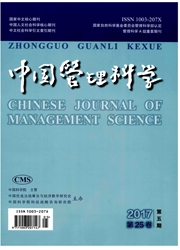

 中文摘要:
中文摘要:
依据条件风险值CVaR度量准则,建立了顾客策略行为下基于回购契约的供应链决策模型,分析了集中式供应链系统和分散式供应链系统中,风险规避供应商和风险规避零售商的决策行为。在此基础上,通过理论求解和数值分析,进一步探讨了顾客策略行为、成员风险规避性和供应链回购契约的交互影响。主要研究结论如下:第一,当供应链成员均为风险规避时,价格承诺可成为顾客策略行为的完美应对策略;第二,最优回购价格受到零售商和供应商的风险规避度的共同影响,零售商的最优订货量随产品回购价格的增加而增加;第三,当且仅当零售商与供应商的风险规避度相当时,回购契约能够实现分散式供应链系统的协调和利润在不同成员间的任意分配,否则回购契约不能实现供应链利润在不同成员间的任意分配。第四,当供应链成员风险规避不等时,零售商的利润分成随顾客对产品估价的增加而增加。同时,风险规避度较小方需要出让部分利润给风险规避度较大方才能够保证契约的实施。
 英文摘要:
英文摘要:
In CVaR framework,decision models for supply chain are proposed based on buyback contract and strategic consumer behavior.Decision behaviors of risk-averse members in both centralized and decentralized supply chain are investigated.In addition,the interactions among strategic consumer behavior,members' risk-aversion and buyback contract are discussed by theoretical analysis and numerical study.The main results are as follows:First,the price commitment can become a perfect strategy to reduce the negative impacts of strategic customer behavior when supplier and retailer are both risk-averse.Second,the optimal buyback price is influenced by members' risk-aversion and the optimal ordering quantity increases with the growth of the buyback price under the decentralized supply chain.Third,buyback contract can coordinate the supply chain perfectly if and only if retailer's risk-averse factor equals to supplier's risk-averse factor.Otherwise,the profit cannot be allocated arbitrarily between supply chain members based on buyback contract.Finally,when retailer's risk-averse factor does not equal to supplier's risk-averse factor,retailer's profit-sharing will increases with the rising of consumers' valuation,and the player with lower risk-aversion has to give a part of profit to the one with higher risk-aversion so as to guarantee the implement of the contract.
 同期刊论文项目
同期刊论文项目
 同项目期刊论文
同项目期刊论文
 期刊信息
期刊信息
